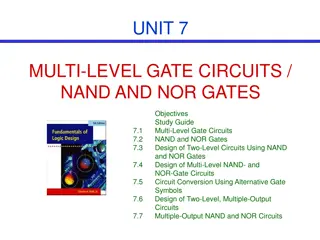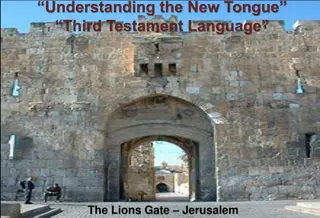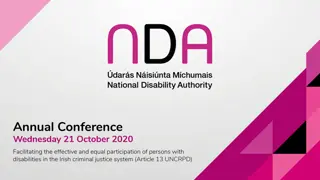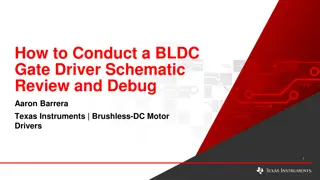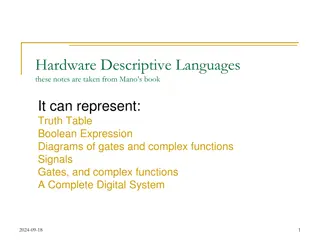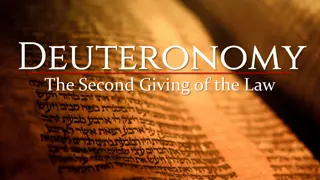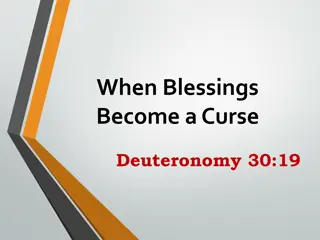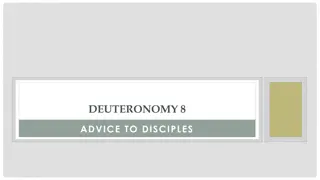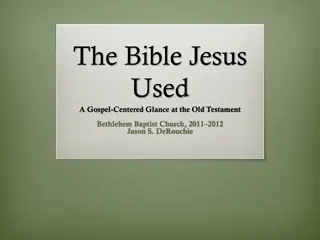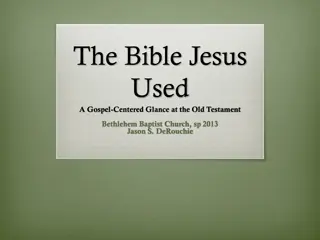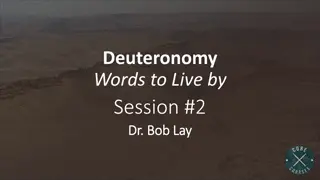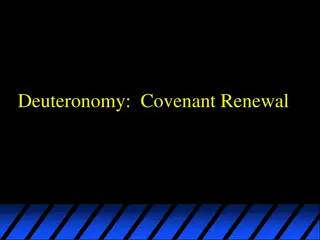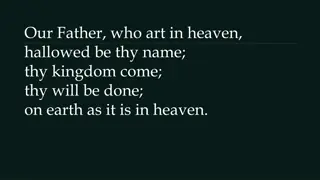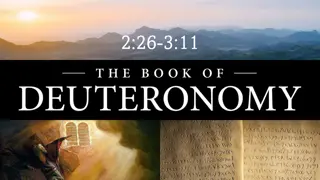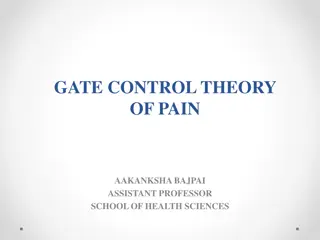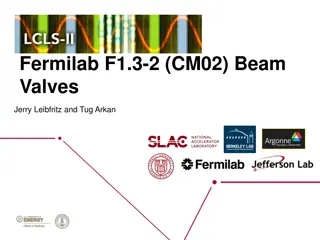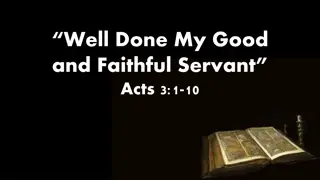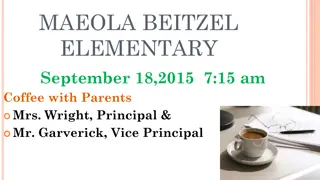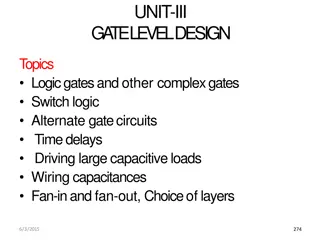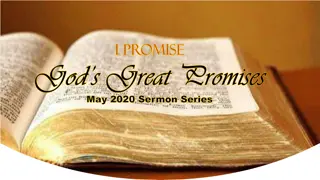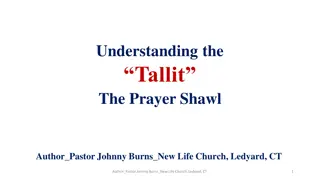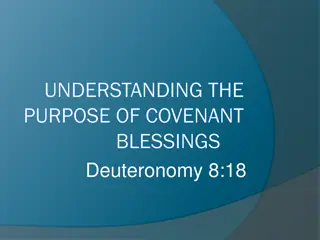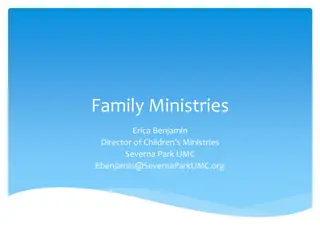Insights on Deuteronomy 6:1 from Jaffa Gate
Explore the meaning of Deuteronomy 6:1, particularly focusing on the significance of plural, singular, and the relationship between commandments, statutes, and ordinances as explained in the text. Gain insights from various sources such as NET Notes, NIDOTTE, and more.
Download Presentation

Please find below an Image/Link to download the presentation.
The content on the website is provided AS IS for your information and personal use only. It may not be sold, licensed, or shared on other websites without obtaining consent from the author. Download presentation by click this link. If you encounter any issues during the download, it is possible that the publisher has removed the file from their server.
E N D
Presentation Transcript
On Jaffa Gate Deuteronomy 6
Deut 6:1 plural plural singular
Deut 6:1 plural plural singular Deut 5:31 plural plural singular
Deut 6:1 plural plural singular Deut 5:31 plural plural singular NET Notes (Deu 5:31) 38 tn Heb "commandment." The MT actually has the singular suggesting perhaps that the following terms epexegetical apposition to "commandment." That is, the phrase could be translated "the entire command, namely, the statutes and ordinances." This would essentially make )mitsvah( synonymous with ) torah(, the usual term for the whole collection of law. ) , hammitsvah(, ) khuqqim and mishpatim( are in
Deut 6:1 plural plural singular NIDOTTE (The New International Dictionary of Old Testament Theology and Exegesis) mis wa , nom. command, commandment OT parallel the various meanings of . In fact, there are numerous passages where the two terms are at least juxtaposed, if not used interchangeably )e.g., Gen 26:5; Exod 16:28; 24:12; Lev 27:34; Num 36:13; Deut 30:10; etc.(. There are many references of referring to general laws of God )Gen 26:5; Exod 20:6( or to the Mosaic legislation in general )Neh 1:5, 7, 9(. Such a use is also seen in the Psalms, in particular Ps 119. Another use in the Psalms is to juxtapose to the fear of Yahweh/God )Ps 19:9; 112:1; see also Eccl 12:13; (. The term is likewise used to describe the cultic contents of Leviticus, both in the sense of specific regulations )e.g., 4:2, 13, 27; 5:17( and the book as a whole )27:34(. The closing verse of Num )Num 36:13( may similarly use to describe the contents of that book. Likewise in Deut the term is sometimes used to describe the book as a whole )e.g., Deut 4:2; 6:1; 11:8; 15:5; 19:9(. In Prov, describes the contents of human or fatherly instruction )e.g., Prov 2:1; 3:1; 6:20; 7:1 2(. It also refers on occasion to the contents of a king s commands )Esth 3:3; Eccl 8:5; Isa 36:21(. The nom. occurs 180x, 43x in Deut. Most of the occurrences of in the OT
Deut 6:1 plural plural singular NIDOTTE h o q, nom. portion, work, task, obligation, specific time, boundary, limit, law, order, definition; h uqqa , due, statute OT generally overlap those of , and . Many instances of and are juxtaposed to these other terms, suggesting possibly that, in those cases, they share roughly the same semantic domains, although some argue for clear distinctions )e.g., refers to cultic law and to civil [TDOT 5:143](. In the final analysis, however, it is difficult to draw distinctions )VanGemeren, 184 87(. 1. The nom. occurs 129x in OT, 100 x. The uses of these two words
Deut 6:1 plural plural singular NIDOTTE mis pa t , nom. judgment, decision by arbitration, legal specifications, legal case, legal claim OT meanings, it has decided judicial connotations. What is most often the topic of concern is the process governing the settling of some dispute, whether between human parties or between God and the Israelites, or the actual verdict itself. is often found in close proximity to other legal terms such as , , , and . 1. This word occurs 425x in OT. Although encompasses a variety of
NIDOTTE denom. vb. from attestation, testimony. u d I(, pi. surround, encircle; po./hitpol. help; hi./ho. warn, admonish, call to witness, a e d, nom. witness; e da II(, nom. witness; t u da , nom. OT witness can testify as an eyewitness to actions, statements, and legal transactions )see Ruth 4:9 11; Isa 8:2; Jer 32:10, 12, 25(. The Mosaic Law carefully regulated legal testimony. A man could not be condemned by the testimony of only one witness )Num 35:30; Deut 17:6; 19:15(. 5. The related nom. often refers to a legal witness to the truth of a matter. Such a OT made. It refers specifically to the seven lambs Abraham offers Abimelech )Gen 21:30( as a reminder of their treaty and oath )see E. A. Speiser, Genesis, 160( and the pillar erected by Laban )Gen 31:52(. In Josh 24:27 the word refers to the stone Joshua set up to testify against the people. Much like the heavens and earth )Deut 4:26; 30:19; 31:28(, the personified stone functions in the role of a covenantal witness. 10. The fem. nom. is used of tangible reminders that an agreement has been
Deuteronomy 6 1 2 3
Deuteronomy 6 4 5 6 7 8 9
Deuteronomy 6 10 11
Deuteronomy 6 12 13 14 15
Deuteronomy 6 16 17 18 19 20
Deuteronomy 6 21 22 23 24 25



